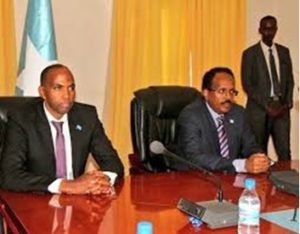By Osman Hassan
Somalia has been rocked by one of its worst political shocks since independence – all at the hands of a government that was supposed to usher a new era of a born-again Somalia – , sovereign, united and a beacon of hope for all Somalis irrespective which Somali land they belong to. Alas, those aspirations have been dashed – at least for now. Within a week, the Government of President Farmajo and Prime Minister Khayre has delivered two devastating successive blows to Somalia’s body politic and dumbfounded its people: First, it did the unthinkable by extraditing an ONLF official, Mr. Abdikarim Sheikh Muse, aka Qalbi Dhagax, notwithstanding he happens to be a Somalia national, to Somalia historical foe, the Ethiopian government – a flagrant violation of national laws and international humanitarian and human rights covenants and conventions.

And while the public were still reeling from the shock waves generated by this extraordinary extradition, the government simply buried its head in the sand for a good week, like the proverbial ostrich, hoping it can weather mounting public outcry. This, it thought, was its only choice rather than admit immediately to its people that it handed the ONLF official not so much he broke any law, but at the behest of the Ethiopian government which, needless to say, is determined to root out the remnants of the ONLF ideologies having succeeded more or less brought its demise militarily. Under pressure, the government was finally forced to break its silence to come up with some post factum concocted and half-baked justifications which, in the public eye, only made matters worse.
What in the end came out were Prime Minister Khayre’s groundless and incompatible justifications for his actions. Speaking to reporters, his Minister for Information stated that the government’s action was dictated by two agreements it signed with the Ethiopia federal government, one in June 2015 and the other in May 2016 which, he claimed, designate ONLF and Al Shabaab as “terror groups” that are a “threat to the security to both nations” and calling on both countries “to collaborate in the fight against them…”. Unfortunately for the government, two of the three signatories to these so-called agreements repudiated the Minister’s claim as a fabrication to justify the government’s illegal action.
A more powerful source rubbishing these agreements came from the former Prime Minister, Omar Abdirashid Sharmarke, who in an Interviewed with VOA Somali Service categorically dismissed these claims and said no such agreements existed between his federal government and the federal government of Ethiopia. For any agreement at the federal level to be binding, he added, it would have to be first approved by the cabinet, then Parliament and finally endorsed by the President, none of which happened. That puts to rest Prime Khayre’s bogus basis for extraditing Abdikarim Muse.
A parallel and unconvincing charge directed at Abdikarim is that his organization is having links with Al Shabaab. If that is the case, why not try Abdikarim for this crime in a Somali court of justice?. The fact it did not so but merely makes unproven gratuitous accusations speaks for itself. As it is, Al Shabaab has categorically denied the existence of any unholy alliance against Somalia and Ethiopia. Al Shabaab seems, for whatever reason, to have a mutual modus Vivendi with the Ethiopian government and rarely ever venture in that country. Their focus, at least for now, is Somalia and Kenya.
The fact of the matter is that the ONLF has no operational bases in Somalia, and it would not be in its interest to undertake actions, such as collaborating with Al Shabaab, that are bound to antagonize their historical protégé, Somalia, and in the end do them more harm than good. What they have in Somalia are individual ONLF officials and /or representatives (and millions of Somali sympathizers). If these officials commit any crimes in Somalia, they should face the full force of the law of the land but not otherwise extradited to face the well-known Ethiopian travesty of justice. The onus is on the government to come up with convincing proof about these alleged links between ONLF and Al Shabaab. So far, the Prime Minister has not produced any such evidence in the case of Abdikarim.

Even if there were valid agreements between the two federal governments regarding extradition of ONLF political activists (which is not the case now), should the Somali government all the same hand over Abdikarim? The answer is no, for the simple reason that any bilateral agreements in this regard would be in flagrant violation of articles 32 and 33 of the United Nations 1951 Convention on refugees which prohibits such actions against the will of the individual(s) concerned, and all the more when they are likely to face threats to their safety and welfare. Furthermore, article 14 of the United Nations Universal Declaration of Human Rights declares:
“Everyone has the right to seek and enjoy in other countries asylum from persecution.”
The underlying fundamental principle at stake here is much wider than the personal freedom or rights of Abdikarim Muse, much as that is important; it is rather what he represents which is the right of the Somali people under Ethiopian colonization (Ogaden as it is internationally better known) to the principle of self-determination. That principle is enshrined in article 1 of the United Nations Charter. It is also embodies in the international Bill of human Rights, namely United Nations International Covenant on Civil and Political Rights, and the International Covenant on Economic, Social and Cultural Rights of 1976. Article 1, paragraph1 states:
“All peoples have the right to self-determination. By virtue of that right they freely determine their political status and freely pursue their economic, social and cultural development.”
And last but not least, it also included in the African Charter of Human Rights of 1984 among others. This body of human rights is applicable to the cause of the Somali people under Ethiopian rule.
It has long been recognized by members of the international community, overtly or covertly, that the “Ogaden” region was Abyssinia’s share of the colonial carving up of the Somali homeland and that the principle of self-determination applies to them as it did to other colonial peoples who, in recognition of that principle, were granted their independence. It is in this regard that a former British Foreign Minister, Ernest Bevin, called at the UN in 1946 for the unity of the Ogaden and other colonized Somali territories (except French Somaliland), albeit all under British administration. It was rejected by some members of the Security, above all the Soviet Union, not because they objected to the principle as such but rather that Britain should benefit from it.
Britain again recognized the right of the Somali people to self-determination, this time in the NFD of Kenya, and accordingly conducted a plebiscite in 1963 among the people, just before Kenya’s independence, asking them to decide whether they wanted to join Somalia or remain in Kenya. Unfortunately, Britain reneged to implement the wish of the people who overwhelming chose unity with Somalia. It bowed to Kenya’s outcry and its greater interest in that country.
It has also to be remembered that most of the international community, above all the western countries, were not unsympathetic to the liberation of the Ogaden in the 1977 war with Ethiopia so long it was waged by the Western Somali Liberation Front (WSLF) and not directly by the Somali national army. As a correspondent for the BBC African Service at the time reporting on the war, I recall the overwhelming sympathy of the western media for the Somali cause, mainly because they saw its struggle as a just one and partly due to revulsion at Mengestu Haile Mariam’s bloody dictatorship (he died today,12 September, of heart attack). Even the Soviet Union is said to have counseled that the Somali military advance stop at Jigjiga. Apparently Mohamed Siyad Barre did not heed that advice, carried away as he was by the wave of nation-wide euphoria, in no mood to compromise.
It is instructive to note that despite its armed struggle, no country in the world other than Ethiopia and China has declared the ONLF as a terrorist organisatioin and both for their own reasons. China did so after the ONLF killed 74 people in 2007, consisting of Chinese oil prospectors and their Ethiopian workers and guards, who disregarded prior ONLF warning to foreign prospectors to stay away from the area. No western country followed suit, or even expelled ONLF representatives from their countries, let alone hand them over to Ethiopia as Somalia did.
It is also a recognition of the right of the Somali Region under Ethiopian rule to self-determination that most western government accept representatives of ONLF to take residence in their countries, giving them similar treatment to that accorded to other liberation movements such as the ANC of South Africa, MPLA of Angola, and those from former Nyasaland (now Malawi), and Southern and Northern Rhodesia (now respectively Zimbabwe and Zambia).
Having largely crushed the ONLF’s guerrilla armed struggle, Ethiopia’s aim is to ensure that it never again rears its head. Towards this end, it spares no effort to snuff out the living aspirations of the Somali people under its rule for self-determination which otherwise is bound to resuscitate, sooner or later, the armed struggle and the quest for freedom among future generations. Towards this end, it is pursuing two-track strategies: one internal and the other externally-oriented. Internally, it has largely succeeded to wean the people off pan-Somalism and unity, and make them instead beholden to a substitute: a sham pseudo regional administration with all its make-believe State paraphernalia, which is hard at work creating an inward-looking clan cultural identity and false nationhood. The result is that many people are duped and increasingly turning their back on mother Somalia in favour of their clan substitute.
Externally, Ethiopia is hunting down ONLF representatives, the torchbearers of self-determination and freedom, and the likes of Abdikarim Muse. It is ironic that while the self-determination of the Somali people under Ethiopian rule has worldwide sympathy or support, and its representatives accorded cordial treatment, it should be a Somali government, of all peoples, the presumed custodian of the aspirations of the Somali people for unity and freedom, that should repudiate their right to self-determination and criminalize its adherents all at the behest of the Ethiopian government, the very arch-enemy of the Somali people.
As the Somali saying goes: Aduunyada nin noolow maxaa aragti kuu laaban (we live to see the unbelievable)!!
Osman Hassan
Email: Osman.Hassan2 @gmail.com
—–
Osman Hassan is a seasoned journalist and a former UN staff member. Mr Hassan is also a regular contributor to WardheerNews.
We welcome the submission of all articles for possible publication on WardheerNews.com. WardheerNews will only consider articles sent exclusively. Please email your article today . Opinions expressed in this article are those of the author and do not necessarily reflect the views of WardheerNews.
WardheerNew’s tolerance platform is engaging with diversity of opinion, political ideology and self-expression. Tolerance is a necessary ingredient for creativity and civility.Tolerance fuels tenacity and audacity.
WardheerNews waxay tixgelin gaara siinaysaa maqaaladaha sida gaarka ah loogu soo diro ee aan lagu daabicin goobo kale. Maqaalkani wuxuu ka turjumayaa aragtida Qoraaga loomana fasiran karo tan WardheerNews.
Copyright © 2024 WardheerNews, All rights reserved


